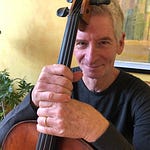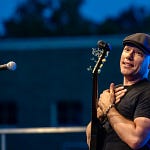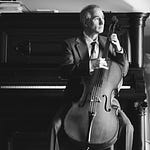005 Richard Julian
Today we're talking with a legit songwriting giant, Richard Julian. You might know his supergroup The Little Willies, or his solo albums like Slow New York or Fleur-de-Lis. He hangs out with the likes of Bonnie Raitt, Randy Newman, Norah Jones and he's got a more recent project: he runs his own club.
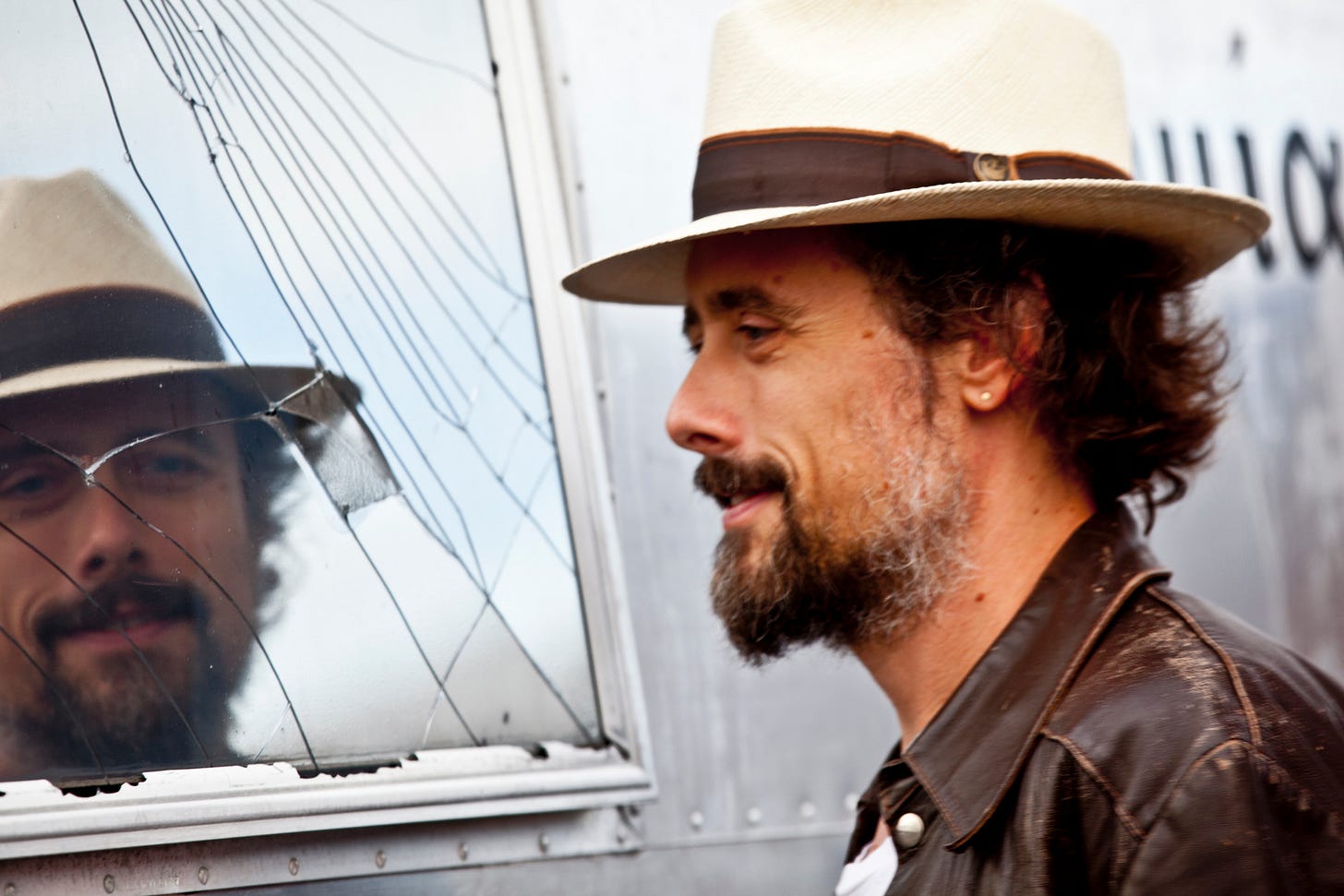
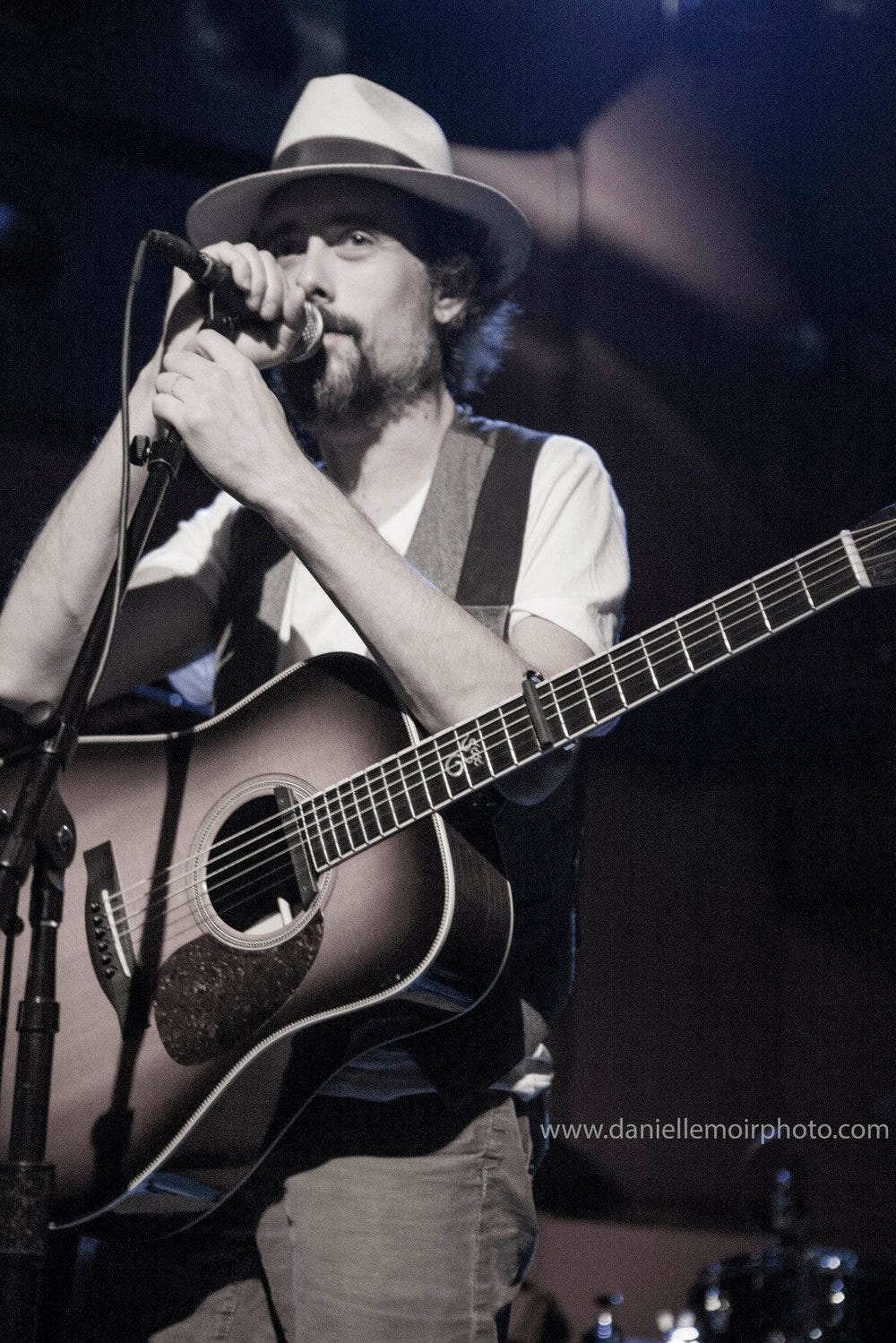
photo by Danielle Moir
Transcript:
[INTRO: at Bar Lunatico]
Here we are, another fine addition of Play It Like Its Music, musicians in their own words. Today we're talking with a legit songwriting giant, Richard Julian. You might know his supergroup The Little Willies, or his solo albums like Slow New York or Fleur-de-Lis. He hangs out with the likes of Bonnie Raitt, Randy Newman and Norah Jones. And he's got a more recent project: he runs his own club. I met him at Bar Lunático in Brooklyn, a classic style music joint with a great menu, ridiculous margaritas and a nightly assortment of the most interesting and sought-after musicians on the scene. Let's hear from Richard.
TREVOR EXTER: Just to get started, state your name and instrument.
RICHARD JULIAN: I'm Richard Julian, and I play guitar, piano and sing.
TE: Awesome, and we are sitting here at Bar Lunático in Brooklyn, which is your place. Is that how you pronounce it?
RJ: Yes.
TE: Italian?
RJ: No one ever pronounces it correctly, but you just did. Yeah, it's Italian or actually since we put the accent over the "a". I'm told that that makes it Spanish, but we only did that to help people pronounce it correctly, which they don't. It didn't help.
TE: Awesome. And you said you lived in this neighborhood since 2004?
RJ: Yeah 2005, maybe. Somewhere back in the mid oughts as they call it. Yeah.
TE: Where did you live before?
RJ: I lived in Hell's Kitchen in Manhattan. I lived there since 1986 in various places around Ninth Avenue, and then I moved out here and bought a brownstone with a couple of other musicians and renovated it, condo'd it. And then that condo I sold and bought this over here to open up Lunático.
TE: Why do you play music?
RJ: Wow. The answer to why I play music has changed over the years. I guess, man I don't even know the answer now. I think of music as language. When I'm playing music if I'm performing, what I'm thinking about is the relationship of what I'm doing to the audience and with the band members.
We're off the computer. We're off the phone. We're off all of that. We're just having a conversation, and I guess that it is a departure from all of that other really predictable conversation that you just... It's a way to escape the doldrum of everything else and to create something that to create another, you know, portal. Another prism to look at things through.
But there's other reasons. I mean, there's... You know probably somebody would hear me answer like that and find it a little pretentious. Like some people would say "oh cuz you like the attention" you know? And "you like me to be in front of people". That's true too, you know?
When I first got involved I came to New York. I came to New York like, you know Jon Voight and Midnight Cowboy. I was gonna be a star, I was like "New York City, here I am!" You know I didn't have any of these pretenses about music. I mean I loved music and always went to hear music. Music was just embedded in me very early, probably because of my mom. So yeah, there's all those egocentric reasons too. There's, you know, there's a ton of reasons for it.
But at this stage of my life, you know - what am I looking for when I book a gig? If people don't come, I'm not as disappointed as I used to be. I'm happy there's some people there to have that conversation with, it doesn't matter if it's 10 people. I'll probably have to work a little harder to make the room feel as elevated as I want it to feel. If there's tons of people there I probably don't have to work as hard, the audience does some work for you in helping the energy - you know - lift up, to unify everybody. So you know that's all. That's it.
TE: What was the first time you ever played music, starting out?
RJ: The first time I ever played music... I don't know what that would be. I know that my grandmother had an upright piano at her house in North Carolina. They had a farmhouse. My mom grew up on the farm - sharecropper's daughter - and they had an upright piano and my sister used to hit it a lot. We pretended that we were The Carpenters, you know Richard Carpenter. So she would have me play - which I really couldn't do- and then she would pretend to sing like Karen Carpenter. I love to sing. My mom's a big music fan. Loves songs a lot especially, she loves Bluegrass and Country especially. Anything that has a narrative that tells a story, or has lyrical content. Which is probably - I'm just guessing - why I ended up in that area of music.
And then we got lessons. My dad found us a teacher up in the neighborhood where we lived in, in Delaware. And me and my sister both started lessons. She was I think nine and I was six, so I started lessons and learning how to play the Für Elise or the Entertainer... Whatever sheet music was being shopped around in the stores at those days.
TE: So it was piano first?
RJ: Piano first. Yeah, I played piano. I did that, I took those lessons for about three years, and then I quit, and then I came back to it because we had a piano. My mom decided to get it tuned - it hadn't been tuned in years - and when the piano tuner came to tune it, he was checking the tuning after he'd done tuning it, and he was just playing, you know, without any music in front of him. And as kind of dumb as this sounds, that was a revelation to me.
I said "did you memorize that music? How did you memorize that?" He said "oh? I'm just improvising." And I said "what's improvising?" You know I didn't know what that meant and he said, "I'm just I'm making it up. I'm just..." You know. And so I said, "can you do that? You just play songs? You just hear them, you play them?" And I asked him if he could play, I think Hey Jude or something. I said, "you know how to play Hey Jude?" and he was like, "yeah sure." You know and he played like a piano rendition of Hey Jude, and I was just... I thought Wow, I can't believe that anybody can do that. And so that got me really interested again, and I asked him how I could learn to do it. And he said get this book, and it was some book on Theory. I can't remember what it was called, but I went and bought it immediately.
It didn't help me at all, it was way over my head but it got me to asking my parents about it. You know, saying "Hey. I want really want to do this" and so I went back to the teacher, actually. The one that taught me the Entertainer. She's an old lady up in the neighborhood. She said "okay, you want to improvise? It's out of my skill set." And she tried to help me find another teacher, and she did. And that teacher really helped me out a lot. He was a guy who lived up the street. He was a jazz pianist, and he helped me tremendously in fact - and there was another teacher Judith Kaye, a guitarist that lived in the neighborhood - to help me get my theory going and all of that shit. So...
TE: Was there a place where you just got into it?
RJ: Immediately, but I've always been like that. I'm a fast mover. I'm even, you know, with the business here that I run I'm even too fast sometimes for my partners, and I make stupid decisions sometimes and barrel full steam ahead. You know? And this was no different. Like, as soon as I understood how to play A minor, C... You know just anything that was a blank canvas as opposed to having to read off sheet music. As soon as I understood what that shit was I was like "I'm a musician. I'm a songwriter!" And I started writing songs.
I was about 13, and I already had five or six songs. Even before I started high school. I had tunes that I could play on piano, and they were my songs. Really stupid silly songs. I wrote, you know they were very serious. They were always... They tried really hard to be profound and to encapsulate the world, you know? I wrote some of them with a guy that I hung out with a lot. You know, my good friend. We wrote them together. Then we started bands and did all of this kind of stuff.
TE: This entry into the music life. How does it compare with this process you've been going through, like becoming a venue owner and proprietor of an establishment? That's a whole other skill set.
RJ: That's a vast question that would take so long to really answer properly. I'll do my best with the little bit of time that we have. [laughs] Both are equally creative endeavors for sure. Running the bar, creating the bar and creating the atmosphere there -
TE: I just want to interrupt for the listener's benefit that this particular bar is definitely a work of art. In terms of the decoration you see, the music curation, the sound system, the way the stage is set up... All of that is clearly put together in a very thoughtful and mindful way. Much more so than than most music venues let alone most bars.
RJ: Thank you for those compliments. You know the decor in the bar is mostly Rosita. I was kind of the facilitator of a lot of her ideas. She's the kind of person to be like "oh we need this type of lamp", but she doesn't really know how to get that type of lamp in there and hung in the right spot and blah blah blah. So I was kind of the guy that conveyed that to people to make it happen, and then we also have another partner Arthur Kell, who has been incredible with some of the booking. Between the three of us we bring a lot of diverse influences into the actual booking.
But probably where me and Rosie - and maybe more me and in terms of this particular aspect - was I've always been very particular about the things that I drink and eat. As, you know, I'm I'm a musician. I love to hear live music more than most musicians that I know actually. Most musicians love to play live music, but you won't see them out at another show. I'm like, I play my show then I'm off to two other shows. I can never get enough of feeling enveloped by improvisation. Just like the guy who came to tune the piano. It's just like, since that moment I've always wanted to be in that moment of watching something get created.
TE: Has that always been the case?
RJ: Oh, yeah!
TE: Do you ever experience, like, burnout or anything?
RJ: No. No not even now, and I hear live music every single night in my bed. I mean it leaks up through the heat pipes. My kid goes to sleep with sousaphone coming up through his heat pipes.
No, it never burns me out. The only thing about it that I don't like is that I have become less of a writer, less of a composer. I was thinking about this very topic last night because I came home with a really good song idea, but I didn't have my keys to go in through the residential side of my building, so I had to go through the bar. And there was some really great jazz playing and I saw some friends, and I thought "I don't want to lose this idea that I want to start". So that did prove to be disruptive, where I know if I was going home to a quieter environment and less about somebody else's music I probably would have gotten a lot more work done last night. I'm still trying to figure out how to get back to that. But I think also having a kid was probably more profoundly disruptive of that process than the bar, because a kid really demands your attention all the time. You know?
TE: Up until this point, what do you say had been your peak writing periods?
RJ: Oh, man. I don't like to think about that. You know I'd like to think that there's peaks in front of me. It doesn't... That's... That -
TE: There's definitely peaks in front of you, but just looking back and, what do you say, like uh "up until this point in the show"...?
RJ: It depends on how you look at all of that. I was telling you before that I wrote since I was 13, and when I was in high school writing all those songs that I would never dream of playing you right now. I just wouldn't dare do it. I wrote a lot of them though. I wrote a lot of them by the end of high school, I don't know how many songs I had. I'm sure back then I knew exactly how many. I'd be like "I've written 51 Songs" or something, but you know I had a lot of songs and then when I first moved to New York - and even when I lived in Vegas for a little while because I was playing keyboards out there for about a year - I just wrote songs constantly. And in my early 20s a day didn't go by where I didn't work on music. I had a typewriter. This is all pre computer. I had one of those old typewriters. I used to sit at the typewriter. Go work on the guitar and have the baseball game on, watch a little baseball, get up, play guitar, get the typewriter, watch a little baseball... Just go around in a circle like that. Clean my house, smoke a joint - which I don't do anymore, but that was the process from about the time I was 19 till maybe I was 26 or 27. I wrote a lot, and a lot of, you know, shitty stuff. Stuff that I look at now, and at the time I'm writing it it felt like "wow this is great. I'm really connecting" and you know I look at it now and it doesn't impress me. Except for rarely. Here and there I'm like "oh nice." I have a song called John and Florine that I still play. I think I wrote that... it would have been the winter of 89 so. I would have been 22, and I still think that's a really great song. You know I feel great about it when I'm playing it in front of people. There was moments where it all really congealed and was more mature than I actually was, you know? Like just kind of stumbled on stuff that advanced me as a person, or as a writer.
TE: Like what are your influences, just on an instrumental level?
RJ: Instrumentally I don't really have that many influences. The influence on my guitar mostly comes from working really hard on each song. What happens is when you play a song a hundred times, two hundred times... Three hundred times over the course of two months that your working on it, you stumble on things on guitar. You make mistakes, you come up the neck and you realize that you know there are resonant strings on the bottom that connect with what you're doing high, and it starts to make you wonder if you really need to have a bar.
Or it starts to make you wonder if you capo'ed up high and played bellish... You know like I did a song last last record about Galileo, and it's called Secret Of The Stars, and I think I capo on the 9th fret maybe or 10th fret. I do a lot of that a lot of high capoing. I tune my strings way down and use thick strings so that the neck won't get too tight and that the thick strings will sound really bellish, you know like sound like bells when I'm playing high, and won't sound chintzy or or cheap. So I do the song, Secret of the Stars, and if you look at the structure of it strictly as a chord chart, I guess it would just be 1-6-4-5 or 1-6-2-5. Maybe. I haven't played it in a while, so I'm just kind of, you know...
It's 1-4-5 with a 6 here and there, but if you hear the guitar part it will not sound that basic. And one of the reasons is, after getting the initial idea of a tune - even if I'm playing really, you know chord changes like "okay here's a G, E, here's a C here's a D..." At some point I want to find the proper register for my voice, so there's a little explorative process that goes there. And then bigger than that, I want to move the guitar as far out of the way of the register of my voice as possible. Which is hard to do because the guitar has a big range. You know you got six strings. They're all fighting for a lot of sonic range so I like to put the guitar way below the voice or way over the voice, and I like the voice to be filling a sonic space. And if I think of the recording that I might eventually make, it's going to have bass or a or a low instrument. If it's not bass, or you know... Just filling all that sonic space.
I think of a portrait like a visual portrait of sound. And my voice is just filling one of those spaces uninterrupted by anything else.
TE: Since we're talking shop is it possible to get it out and maybe have the instrument?
RJ: I have to remember how to play it! I haven't played this song in a while, but pretty sure it's in a-flat. [Grabs guitar]
See I'm tuned down a half step. That would mean if I'm playing in C I want to get my root there. That's an E. Flat, and all that does is release the tension a little bit because I'm using very thick strings. This is a 13, so if I had this tuned all the way up to pitch the guitar would feel very tight. Some people would like that, but I don't. And what it does is, it helps me do things up here, so like I have this tune called Window for instance like, [strums] that sounds, really you know that sounds fat up there. That's a 13 string. And so. plus the Rosewood... This is all rosewood so it has a deep sound, if I played this same thing on a Gibson Hummingbird or something that had maple or something that had mahogany, and it was tuned normal tuning and it had light strings the way that most people do their guitar, this would not sound as majestic is as to me.
[guitar]
Listen to that tone, it's very beautiful. So like I was telling you about that tune Galileo. I'll play it for you basically, so I'm in a-flat right? So the tune starts out down here 'cause I'm just getting the idea for the for the tune here. I'm at you know... Where is a-flat, so I was probably down here.
[plays] Just playing in G. "Galileo Galilei slipped through the day rough night out under the stars." She's like a little Irish tune or something you know ... With not as great a melody. "Galileo Galilee in his long bearded way was working himself much too hard / in search of a key to the Galaxy some theory he hoped would prove true / poor sap put himself through all that, what he needed was a lover like you". So that might help me get a good lyric idea, you know because it's got a folk song and we've all heard those folk songs. They're familiar. They're embedded in us, so I might get a cool lyric strumming something like that.
But to me to get out in front of an audience and play that is just boring. I mean it just bores me to tears you know. You know I just I'm not into that. Also in the way of my voice, da-da-da-da da da-da-da-da da da-da-da-da.... Oh well anyway. That's all super "inside" of all of these cords, so your vocal's just swimming in this sea of strumming. You know so I come up here. I go: [strums]
Okay. I want my voice to be down there, and I want the guitar to be up. So I come up and go up to see "Galileo Galilei. Slip through the day a rough night out under the stars. Galileo Galilei in his long bearded way was working himself much too hard...." So that helps separate sonically where the voice is laying, where the guitar is laying, then you still have this problem of the boring strumming.
I love to use a capo because you can do things like, there's a C chord, but you can also play it here. Which I think doesn't have a third or does up here, but some of these are repeats...
We'll let the sirens go by. Welcome to New York!
Yeah, um so listen to that: so I'm playing what would normally be a bar. A lot of people play that C inversion that's an A, that's I think called a second position bar when you're doing an A, but I'm taking off the bar and allowing these to resonate against it..... So I'm creating two pedals: those two G's, two E's and the root on the bottom sounds just kind of pretty and sort of like a little music box or something. And then once you find these spots... I love pedals, like strings that rub against each other. They're slightly out of tune with each other.
So the tune ended up going, "Galileo Galilei slip through the day, rough night out under the stars. / Galileo Galilei in his long bearded way was working himself much too hard / in search of a key to the Galaxy, some theory he hoped would prove true poor sap / Put himself through all that, what he needed was a lover like you / galileo's the one who first claimed the sun is the center of everything else / but the powers-that-be threw down this decree. Ye keep that shit to thine self."
You know, onwards like that, but that's the guitar part. Out of those.
TE: You go through this process of, you know you create a lyric in one kind of zone... Shorthand is like maybe "that's the most comfortable place for that type of development". Then once you have the lyric it's like let's move into phase 2 where it's, like "create a performance, create an arrangement" and then all bets are off and you can sort of move things around based on their utility -
RJ: Just to be clear, I'm probably at phase 2 still working on the lyric. I'm always working on the lyric even after I recorded the song. I have a weird OCD about lyrics, and I just keep working on them. The first process - stage one as you put it - gets the nucleus of the story out or inspires the story. And then stage 2, I'm still working on the lyric. And those sounds and that feeling inspire the lyric to evolve. Because maybe some of the lyrics you had - that were more to the Irish sort of strum - sound too belligerent against something that's more delicate. So that might evolve. And I also might go to the piano, figure it out on piano and play it on piano for a while just to create another dimension, another portal, another place to get through to the lyric and have a different feeling and allow other feelings to come through.
TE: And this is all before anyone hears the song by the way?
RJ: Yeah.
TE: Is this a pretty standard process you go through?
RJ: Almost with all the songs. I mean, the best-case scenario, which is the rarest scenario - as always in life - is you write the song really quickly. You know, you get a lyric and the next thing you know you've got three verses and an idea for a bridge, and it's really solid. That doesn't happen to me almost ever, but it does occasionally happen.
I wrote a tune one time just standing in line at the post office. You know which... The post office out here is pretty bad so that's actually not that much of an accomplishment [laughs]. But for me it was, you know, I mean.... So I was like "wow I just walked into the post office and I came out, and I had this song"... Even with that, there is going to be this guitar, this instrumental process that is going to go through a few phases to bolster that lyric and find the proper melody and find all that stuff, you know?
TE: So about that process... What's your process around getting it ready for the world?
RJ: I love that book that Steve Martin wrote about doing stand-up comedy and about all the things that are in your way, all the ways that it can go wrong, you know, because of an audience. You know, some dickhead can come into the place you're playing and make your life miserable, you know? But I did this record called Sunday Morning in Saturday's Shoes and while I was writing those tunes I was booking steady gigs at the Rockwood Music Hall, which was only room one at that point. And I just trying them out week after week. That was super helpful. Some of those things happened sometimes, if you really wanted to hear how a song was going to go, something interrupted it. You would have to wait till next week to see if you really had something.
It is a funny thing, you can tell right away often if what you're doing is connecting as soon as you're in front of any other person. Any other human being even, and not music fan. You can just kind of sense the veracity of what you've put into the tune when you're being spied on by another human being. You're in this process alone, and as soon as you break it out suddenly it's like "oh that thing I have in there is bullshit. It feels like bullshit when I sing those words in front of somebody. It feels forced when I go to this modulation, this...." I have to work on those moments to make them feel more natural or as if they belong. Not just belong in the song, but belong in the world. That's really what you're looking for.
TE: How does the process adapt to being on the road? Can you write on the road too?
RJ: Yeah I love writing on the road. I get a lot of writing done on the road, I get way more writing done than I do in New York. I haven't really had any substantial period of writing in New York since Sunday Morning in Saturday's Shoes. I wrote those tunes around 2007, so it's been about a decade since I have, you know, been on fire with the writing in New York City itself. And even before that it had been probably another decade, because I wrote most of slow, New York, you know on the road and in Nashville. Did very little of it in New York, which is kind of funny. "Slow New York" I wrote so much of it in Nashville. The song Slow New York was an earlier song though, I had written it in New York, like maybe the early 90s or something. And New York is tough. It's getting tougher because I have a bar downstairs that I run and it's chaos here. It's really hard to get the peace of mind. Two songs on Sunday Morning in Saturday's Shoes, the title track and Can't Go Back, which were the first two songs I had written for that record, I left town. Booked myself in a hotel way up North near the Adirondacks for about three days. Just this shitty hotel next to a putt-putt course with my friend Lee Alexander.
He booked one room, I booked another and all we did was work on songs. Not together, separately. And then got together for coffee in the morning, dinner at night. And I did nothing but write all day long for about three or four days to kind of get my writing flow back. And then once it's back I feel like I could write in a crowded room. I could write at a cocktail party if my head is in the space of crafting lyrics or whittling down something. I did it again last April: I booked a place in Oaxaca with the idea of going down there to write, but then I went down there. There was all these Mezcal bars, and I also carry this really good Mezcal here at the bar. And I met with the distributor, and he wanted to take me out to the to the Agave farms... And I just ended up drinking Mezcal the whole time and going to watch it get produced. Which was a whole nother super spiritual experience. I really love agave. Sometimes almost more than music - just the mystery of agave is something that really fascinates me. The process of it, how long... It's just like songwriting. Some of the plants - unlike wine which rejuvenates every year - agave, you plant something and don't even dig it up for sometimes up to 20 years. Anywhere between six and 20 years depending on the agave varietal. And that process really holds a lot of fascination for me. So you know I blew off my writing to go get in touch with that.
But yeah, you know that's a good thing. It's something I should do, soon maybe, is go up with all these ideas. I didn't go up empty-handed to the hotel. I went, I had tons of ideas. Tons of notes. Just wasn't getting any work done.
Unlike a sculptor for instance. Like if you were a sculptor, if you were a Cellini. You know you know somebody from that time. I don't know if you ever read the Cellini autobiography, but he would get commission to do a sculpture. Maybe it would be made out of wood or out of crystal or, you know out of metal or something like that. And the first thing he had to do was go procure a block of wood. A block of metal. You know like whatever it is that he was going to be carving. With songs there's nowhere to go get that. I mean there's musical information, there's music theory, but you're just basically trying to draw something out of the air. So the hardest part of the process for me is actually procuring the materials to make the thing.
So if I went up to the hotel it was to create a bunch of prototypes to basically create material to then write off of. That was the idea, and I can't get that kind of headspace in New York city.
TE: So what should a young player avoid completely, not waste their time with?
RJ: Oh, man. I would never give advice to a young musician. Any advice.
Because I didn't follow anybody's advice. And you know, I didn't even follow people's advice when they told me not to open this bar. Everybody will tell you what not to do, what to avoid. But you should just follow your own instincts. You should follow whatever voices are in your head that are recurring.
You know when you keep having the same idea over and over again, that you should do something? That means you're supposed to do it. That's your instinct telling you do this. And don't let anybody tell you to do it any differently. And if you actually follow through on your instincts you'll probably find out that some people that were naysayers were correct.
You find out your own limitations. Some people are right, you know, but who cares? The information isn't valuable coming from someone else. It doesn't provide you with any wisdom to carry forth. The information... You have to figure it all out by yourself.
TE: Perfect answer. Richard Julian, thank you very much.
RJ: Thank you, it was fun. Those are good questions.
TE: [OUTRO] How about Richard Julian? You can find him at Richard Julian music.com. Now go follow Bar Lunático on Instagram @ Bar Lunático or better yet, just go there and sip on a Mezcal while listening to somebody play. People still do that. It's a great spot.
This is Play It Like Its Music.
Thank you so much for listening to the show. It means everything to have your ears and support each time you pass the link to your friends, review us on the web and help out financially.
These are the players I admire the most, and as a working musician myself I'm always looking to get to know them in a deeper way. Find out stuff that might help me become a better musician.
I love sharing these moments with you and reading your feedback and questions at our website playitlikeitsmusic.com where you can browse other episodes and support the show.
We are 100% listener funded. It's how we can have the conversation we need to have in an age when we're all contending with a mutating professional landscape, jacked revenue streams and a lot of noise out there in the culture.
These are exciting times. It's almost as if the simple act of playing an instrument is a revolutionary one.
We don't draw any lines between scenes or styles, so if you haven't done it already, head over to the web site and join the community. You can use PayPal or make a recurring pledge through Patreon, where we offer a selection of merch and rewards.
As always, thank you for listening and remember to play it like its music.



